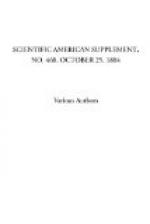afford such a ready means of testing that more examinations
will be made before firing a shot, thereby insuring
greater safety. 8. In testing for gas with a safety
lamp there is a fear of the light being extinguished,
when the lamp is suddenly placed in a quantity of
gas, or in endeavoring to get a very small light;
this is especially the case with some kinds of lamps.
With the detecter this is avoided, as a large flame
can be used, which is considered by some a preferable
means of testing for small quantities; and the test
can be made without risk. Where gas is present
in large quantities, the blue flame at the end of
the test tube will be found a further proof. This
latter result is produced by the slightest compression
of the ball. (I need not point out the inconvenience
and loss of time in having to travel a mile or more
to relight.) As regards the use of the detecter with
open lights, several of the foregoing advantages or
modifications of them will apply. Instead of
having to use the safety lamp as at present, it is
thought that the working place will be more frequently
examined, for a sample of the suspected atmosphere
can be carried to a safe place and forced on to the
naked light, when, if gas be present, it simply burns
at the end of the mouthpiece like an ordinary gas
jet. There are other advantages, such as examining
the return airways without exposing the lamp,
etc.,
which will be apparent, and become of more or less
importance according to the conditions under which
the tests are made.
In conclusion, I wish to paint out that the practice
adopted at some collieries, of having all the men
supplied with the most approved lamp (such as the
Mueseler or tin shield lamp) is not a safe one.
If the strength of a chain is only equal to the weakest
link, it may be argued that the safety of a mine is
only equal to that of the most careless man or most
unsafe lamp in it. If, therefore, the deputies,
whose duty it is to look for gas and travel the most
dangerous parts of the mine, are obliged to use the
Davy on account of its sensitiveness, may it not be
said that, as their lamps are exposed equally with
the workmen’s to the high velocities of air,
they are the weak links in the safety of the mine?
For the reasons given, I venture to submit that the
difficulties and dangers I have mentioned will be
largely reduced, if not wholly overcome, by the use
of the fire-damp detecter.
* * * *
*
CAMERA ATTACHMENT FOR PAPER PHOTO NEGATIVES.
In computing the weight of the various items for a
photographic tour, the glass almost invariably comes
out at the head of the list, and the farther or longer
the journey, so much more does the weight of the plates
stand out pre-eminent; indeed, if one goes out on
a trip with only three dozen half-plates, the glass
will probably weigh nearly as much as camera, backs,
and tripod, in spite of the stipulation with the maker
to supply plates on “thin glass.”




